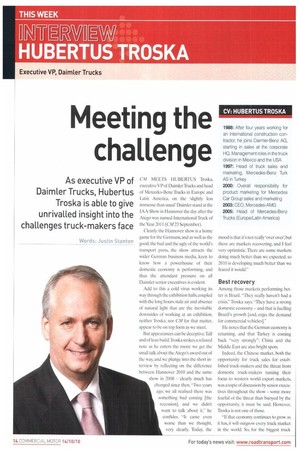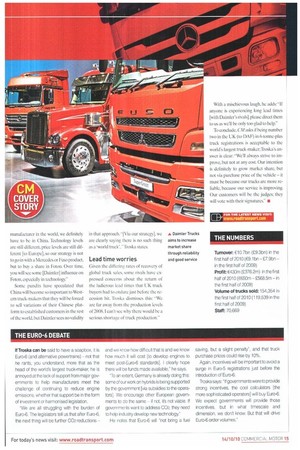CV; HUBERTUS TROSKA
Page 14

Page 15

If you've noticed an error in this article please click here to report it so we can fix it.
1988: After four years working for an international construction contractor, he joins Daimler-Benz AG, starting in sales at the corporate HO. Management roles in the truck division in Mexico and the USA 1997: Head of truck sales and marketing, Mercedes-Benz Turk AS in Turkey 2000: Overall responsibility for product marketing for Mercedes Car Group sales and marketing 2003: CEO, Mercedes-AMG 2005: Head of Mercedes-Benz Trucks (Europe/Latin America) mood is that it's not really 'over over', but there are markets recovering, and I feel very optimistic. There are some markets doing much better than we expected, so 2010 is developing much better than we feared it would."
Best recovery
Among those markets performing better is Brazil. '"Ibey really haven't had a crisis," Troska says. "They have a strong domestic economy and that is fuelling Brazil's growth [and, ergo, the demand for commercial vehicles]."
He notes that the German economy is returning, and that Turkey is coming back "very strongly"; China and the Middle East are also bright spots.
Indeed. the Chinese market, both the opportunity for truck sales for established truck-makers and the threat from domestic truck-makers turning their focus to western world export markets, was a topic of discussion by senior executives throughout the show some more fearful of the threat than buoyed by the opportunity, it must be said. However, Troska is not one of those.
"If that economy continues to grow as it has, it i.vill outgrow every truck market in the world. So, for the biggest truck manufacturer in the world, we definitely have to be in China. Technology levels are still different, price levels are still different [to Europe], so our strategy is not to go in with a Mercedes or Pus° product, but to buy a share in Foton. Over time, you will see some [Daimler] influence on Foton, especially in technology."
Some pundits have speculated that China will become so important to Western truck-makers that they will be forced to sell variations of their Chinese platform to established customers in the rest of the world,but Daimler sees no validity in that approach. "[Via our strategy], we are clearly saying there is no such thing as a 'world truck', Troska states.
Lead time worries
Given the differing rates of recovery of global truck sales, some rivals have expressed concerns about the return of the ludicrous lead times that UK truck buyers had to endure just before the recession hit. Troska dismisses this: -We are far away from the production levels of 2005.1 can't see why there would be a serious shortage of truck production."
With a mischievous laugh, he adds: "If anyone is experiencing long lead times [with Daimler's rivals], please direct them to us as we'll be only too glad to help."
To conclude, CM asks if being number two in the UK (to DAF) in 6-tonne-plus truck registrations is acceptable to the world's largest truck-maker;Troska's answer is clear: "We'll always strive to improve, but not at any cost. Our intention is definitely to grow market share, but not via purchase price of the vehicle — it must be became our trucks are more reliable, because our service is improving. Our customers will he the judges: they will vote with their signatures." •




























































































































